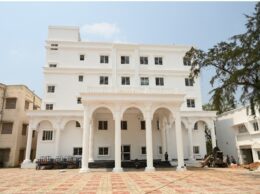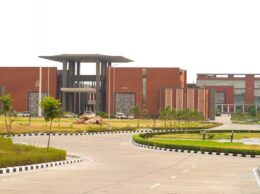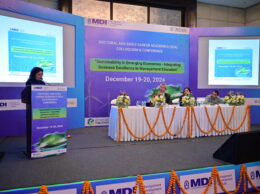Bengaluru: The health care world is on the threshold of a major transmission from laparoscopic surgery to robotic surgery. The wave of changes are visible in India also. Narayana Health headquartered in Bengaluru has launched the Institute of Robotic Surgery supported by Infosys Foundation at its flagship unit at Narayana Health City. The da Vinci Robotic Surgical System will be used primarily for prostate, kidney, gynecological, colorectal and select head & neck cancer surgeries.
Symbolically unveiling the plaque, signifying the launch of ‘Infosys Institute of Robotic Surgery’, Mrs. Sudha Murty, Chairperson – Infosys Foundation said, “The need to adopt and continually update treatment protocols that reduce errors is crucial for a country like India, which sees high patient volumes and a wide spectrum of complex diseases. Robotic surgery, with its high degree of precision and faster recovery time, has the potential to address this efficiently. Our partnership with Narayana Health, incontestably a pioneer in delivering world-class healthcare, is aimed at encouraging rapid adoption of robotics in healthcare in India.”
Technique of surgical intervention on the human body is undergoing dramatic change. It took over 30 years for laparoscopic surgery to replace open abdominal operation. “World is on the threshold of a major transition from laparoscopic surgery to robotic surgery”, said Dr. Devi Shetty, Chairman – Narayana Health. Robotic surgery has proved that inaccessible areas of the human body like deep in the pelvis where a prostate surgery needs to be done for a patient with cancer of the prostate can easily be accessed. Robotic surgery has proven beyond doubt its supremacy.
“It is a matter of time before most procedures on the human body will be done better with the robotics. However, for the large scale technical adoption of robotic surgery major hitch is the surgeon’s skill”, informed Dr. Shetty. Today surgical robots are available in very few centers across the world and the training program to train an experienced surgeon as a robotic surgeon is expensive and inaccessible.
Explaining the learning curve, Dr. Saurabh Bhargava, Head of Urology Department, Consultant Urologist and Uro-Onco Surgeon at Narayana Health City said, “Our training program is mentor-based rather than building patient base to have a learning experience. We have acquired skills, so that we have competence to train others, that’s what needs to be done. So the learning experience takes place with a mentor in place at Narayana Health”.
All surgeons have to undergo a formalized mentorship program. The Robotics team has been through an extensive clinical education, training and preparation period. The training is provided in a phased manner. Phase 1 includes basic training explaining the concepts, technology, features and functionalities. The operating surgeon has to first understand the technical aspects of its work, how to set it up, how each part works and its role. Then the surgeon attends a simulator workshop and practices on mannequins, followed by a period of observation. Then with a mentor in place the surgeon begins with simple techniques and then gradually moves on to more complex surgeries.
Surgeons use a computer-controlled robot to assist them in certain surgical procedures. There are around 15 types of surgeries that can be performed using Robotics technology. At Narayana Health City the da Vinci Robotic Surgery System is installed in a dedicated operating room with dedicated and well-trained surgeons, assistants and staff exclusively for Robotic Surgery capable of performing complex surgeries in Urology, Gynecology, Gastrointestinal surgeries, and General Surgery and various types of cancer treatments.









